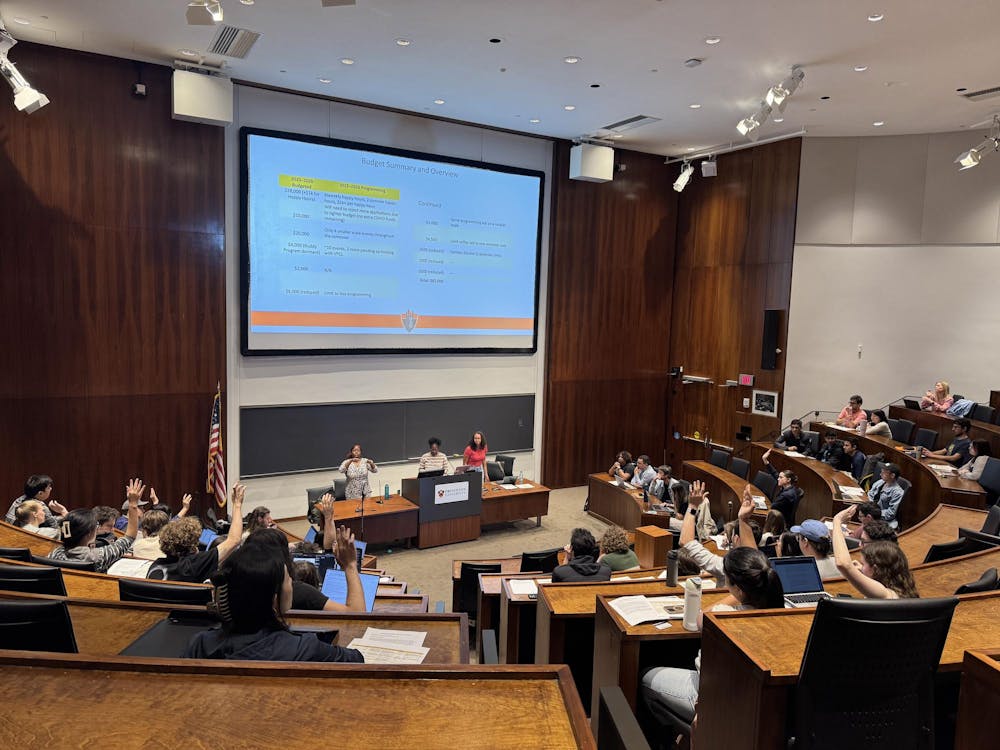At the final Graduate Student Government (GSG) meeting of the semester on May 13, discussions about the proposed budget for the 2025–26 academic year and GSG’s proposal for a new “Student Life Fee” turned tense. After a 90-minute meeting, the GSG Assembly voted to appoint an auditor to report on GSG’s budgetary expenses and to indefinitely delay the implementation of a Student Life Fee by the Assembly. The Student Life Fee would have been a mandatory $100 fee to fund GSG’s budget and initiatives, separate from the current $27.35 Graduate Student Government fee.
The meeting, which was attended by around 70 people, was preceded by tensions on the graduate student “Princeton Grads” Slack over the proposed student life fee proposal.
On Monday, the day before the meeting, Jacob Votava GS wrote in the “community-announcements” channel that “Effective next year, the Graduate Student Government (GSG) fee will rise by 400%. This has not been communicated to us,” sparking heating discourse about a fee that was still in the proposal stages.
Various graduate students responded to Votava’s message, citing transparency issues across GSG in general.
“This isn’t about bypassing the Assembly — it’s about the fact that most students had no idea a $100 fee was being discussed until the day before … that is a transparency issue,” one student wrote.
“It is a fact that most students don’t know who their GSG reps are or how GSG works,” another response read.
During the meeting, GSG Treasurer Seraya Jones GS outlined the proposed GSG operating budget for the 2025–26 academic year of $83,000, a decrease from the $94,000 budget this academic year due to inflation and the depletion of COVID funds. However, many graduate students in attendance expressed concerns about GSG’s past expenditures, which went $6,000 over budget according to the handout from the meeting.
In a statement to The Daily Princetonian after the meeting, GSG wrote that the “Graduate School had mistakenly not provided $2,000 for our IvyPlus conference, and this has since been corrected,” meaning the past expenditures were only around $4,000 over budget in total.

“Is there a more detailed breakdown … of where the money is specifically going?” Wesley Oliver GS asked.
“I think there’s nothing to be suspicious about in this budget. These are all very typical expenditures. You would struggle to run an office for a year without expending some amount of money on office supplies,” GSG Assembly member Stefan Clarke GS said.
Although many grad students requested to see a full ledger of all expenditures, Vice President Caridad Estrada GS noted that the ledger could not be made public. “Not even everybody on the Executive Board has access to the ledger,” Estrada said.
Instead of a public review of the ledger, a motion for an auditor to examine and report on GSG’s budget passed with 20 for, one against, and three abstentions. The auditor will be appointed and voted for by the Assembly.

Still, many grad students were distrustful of the budget and ultimately passed a motion to delay voting on the budget. Asynchronous voting on the budget will take place virtually at an unspecified date no later than two weeks after the meeting. This motion passed with 15 for, four against, and three abstentions.
GSG President Amari Tankard GS then introduced the “Student Life Fee” proposal of $100 per year. Currently, Princeton graduate students are subject to a GSG Fee — $27.35 annually that increases proportionally to graduate students’ stipends — and a Graduate College Member Fee — $25 per term for residents and $15 annually for non-residents. The student life fee, as with the current fees, would be mandatory for all graduate students.
The student life fee is intended to help address rising costs over the past few years while maintaining “a fulfilling graduate education experience,” according to the GSG’s proposal. With this new fee, the GSG would have an expanded budget of $322,500, according to the proposal. This would be allocated towards conference travel grants, graduate student organizations and events, wellness programs, diversity and inclusion, and general GSG initiatives.
Tankard said that Princeton’s current grad student fee of $27.35 is “the lowest student fee of any [Ivy+] school beside Yale.”
“Harvard had a yacht party, Yale had a yacht party, we had nothing,” Tankard said, noting that GSG’s budget was dwarfed by many of its peer institutions.
However, many grad students in the room had questions about whether or not this new fee is allowed under the GSG Constitution.
“As we’ve all just witnessed in this insufferable room … all budgets [including the expanded budget] will be approved by the Assembly,” Tankard said.
Lucas Frye GS pointed out that according to Article X of the constitution, changes to student fees require a referendum to be voted on by graduate students. The constitution reads “For the change to be adopted, three-fifths of those voting must approve the amendment, and that three-fifths must be greater than or equal to one-third of those eligible to vote.”
However, Tankard said that this would make the proposal difficult to pass given the lack of graduate student turnout at elections. “A student-wide vote to increase the fee failed in 2022 not due to lack of support but due to lack of quorum,” the proposal reads.
Meeting attendees and Assembly members then debated whether the fee could be instituted without a student-wide vote. Jan Ertl GS said that this is an “interpretation question,” since the proposal seeks to introduce a new fee rather than amending the current fee. This interpretation was supported by Assistant Dean for Student Affairs at the Graduate School Heidi Freeman, who was present at the meeting.
“We [the Graduate School] are in agreement with their interpretation of the Constitution, that they couldn’t raise the existing activity fee, but that they could propose a different, separate fee [that would not be up for referendum],” Freeman said. Oliver, meanwhile, called “any increase in any kind of fee” a “perverse interpretation.”
“This seems to be a lot about trust and transparency, and I don’t really care if the fee increases to $100,” said Mohamed Atouife GS, “but the main thing for me is … you came up with this loophole to add a new fee because there was constitutional ambiguity, which kind of seems undemocratic.”
“The Constitution is unfortunately very outdated,” Tankard replied. “So it’s not a loophole … I’d love to interpret it as a student to help graduate students.”
Responding to a question about whether or not they could introduce a slightly lower fee, Tankard said “we are very much amenable to perhaps suggest a budget that includes a lower fee, even $50 or $25 but I think that, again, that budget has to be approved by the Assembly.”
Ultimately, a motion was introduced to delay the question of enacting this proposal by the Assembly indefinitely. This motion passed with 13 for, three against, and six abstentions.
The proposal would have put graduate student life fees at a total of $127.35 per year. The Undergraduate Student Government (USG), for comparison, charges undergraduates $95.50 per semester, totaling $191 per year.
The GSG meeting ended at 7:45 p.m., after two motions were passed to extend it from its original ending time of 7 p.m.
Beyond the budget discussions, a motion to establish a Committee for GSG Assembly Inclusion was passed. This new committee will be chaired by Ertl and Estrada and is intended to “codify better operational procedures for GSG and [the] Assembly such that any graduate student can easily stay informed,” according to the meeting minutes.
Nikki Han is an assistant News editor and a contributing Features writer for the 'Prince.' She runs the Faculty, Graduate Students, and Alumni coverage area.
Please send any corrections to corrections[at]dailyprincetonian.com.
Correction: A previous version of this article incorrectly stated the threshold to pass a graduate student referendum, as well as one portion of a quote from Tankard. It also stated that the prospective graduate student life free would have exceeded the USG fee if passed. In face, this is not the case. The ‘Prince’ regrets these errors. This article has also been updated to include a statement from GSG after the meeting regarding the budget for the Ivy+ Conference last year.








